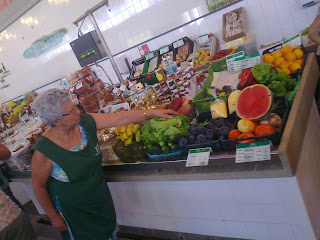Tomar decisões, alterar hábitos e reduzir emissões na alimentação
Quando falo sobre o tema do consumo sustentável normalmente as pessoas não acreditam que é possível mudar alguma coisa.
Há sempre um desânimo geral.
Um pessimismo porque todos sabemos que é muito difícil mudar hábitos de consumo individuais.
Por isso discute-se cada vez mais quais as decisões mais eficazes.
É preciso imaginação, colaboração entre diferentes sectores da sociedade, e testar diferentes alternativas.
Este estudo aborda os 2 extremos da cadeia de alimentação: a produção agrícola e o consumo.
Analisa mecanismos de governância dos mercados como regulacão, economia, voluntariado e, informacäo. Várias hipóteses, umas mais restritas que outras.
Mas nenhuma sozinha será efectiva para reduzir emissões de gases com efeito de estufa e devem ser sempre considerados os contextos sociais, culturais e, económicos em que as medidas serão aplicadas.
Climate and agriculture are inextricably linked: the climate affects agricultural production and is itself affected by agricultural emissions.
Agriculture is responsible for 30 per cent of global greenhouse gas emissions.
How agriculture is practised therefore has significant potential for mitigating climate change, for providing food security and for improving the livelihoods of millions of food producers worldwide.
The key messages emerging from this study are that economic measures have a vital part to play within this regulatory context, but they need to be designed with care.
To be effective, emissions from food production and consumption must be addressed together. If not, emissions reduced in one region will simply be displaced elsewhere.
A balance needs to be struck by applying a mix of approaches – regulatory, economic, voluntary, and information: no single measure will be effective in achieving emissions reductions on its own.
‘Soft’ measures, such as voluntary agreements and information have a part to play in providing an enabling context for action, but they must be backed up by ‘harder’ regulatory or economic measures.
Regulation, in the form of a cap on emissions, is a prerequisite for other market governance measures to function well.
To be effective, MGMs need to consider the social, cultural and economic context within which they operate.
Granett, 2012. Climate change and agriculture: can market governance mechanisms reduce emissions from the food system fairly and effectively?
Há sempre um desânimo geral.
Um pessimismo porque todos sabemos que é muito difícil mudar hábitos de consumo individuais.
Por isso discute-se cada vez mais quais as decisões mais eficazes.
É preciso imaginação, colaboração entre diferentes sectores da sociedade, e testar diferentes alternativas.
Este estudo aborda os 2 extremos da cadeia de alimentação: a produção agrícola e o consumo.
Analisa mecanismos de governância dos mercados como regulacão, economia, voluntariado e, informacäo. Várias hipóteses, umas mais restritas que outras.
Mas nenhuma sozinha será efectiva para reduzir emissões de gases com efeito de estufa e devem ser sempre considerados os contextos sociais, culturais e, económicos em que as medidas serão aplicadas.
Climate and agriculture are inextricably linked: the climate affects agricultural production and is itself affected by agricultural emissions.
Agriculture is responsible for 30 per cent of global greenhouse gas emissions.
How agriculture is practised therefore has significant potential for mitigating climate change, for providing food security and for improving the livelihoods of millions of food producers worldwide.
The key messages emerging from this study are that economic measures have a vital part to play within this regulatory context, but they need to be designed with care.
To be effective, emissions from food production and consumption must be addressed together. If not, emissions reduced in one region will simply be displaced elsewhere.
A balance needs to be struck by applying a mix of approaches – regulatory, economic, voluntary, and information: no single measure will be effective in achieving emissions reductions on its own.
‘Soft’ measures, such as voluntary agreements and information have a part to play in providing an enabling context for action, but they must be backed up by ‘harder’ regulatory or economic measures.
Regulation, in the form of a cap on emissions, is a prerequisite for other market governance measures to function well.
To be effective, MGMs need to consider the social, cultural and economic context within which they operate.
Granett, 2012. Climate change and agriculture: can market governance mechanisms reduce emissions from the food system fairly and effectively?

